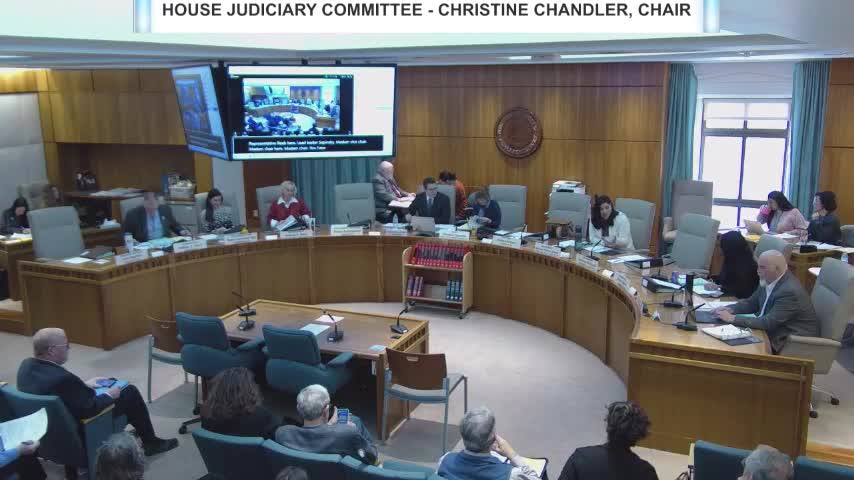House committee advances bill requiring lobbyists to disclose employers and bill positions during session
Get AI-powered insights, summaries, and transcripts
Subscribe
Summary
The House Judiciary Committee voted to give House Bill 143 a do-pass recommendation after adopting an amendment that requires lobbyists to file a lobbying-activity report online, identifying their employer and position on specific bills within 48 hours of starting activity.
The House Judiciary Committee on Oct. 12 advanced House Bill 143, a lobbying-transparency measure that would require paid lobbyists to file a one-time lobbying-activity report during a legislative session and link it on the Secretary of State’s website.
Supporters say the change would make clearer who is influencing legislation and allow both legislators and the public to see which employers are behind lobbying efforts on particular bills.
The bill’s sponsor, Representative Silva, and co-sponsor Senator Steinborn told the committee the report would name the lobbyist’s employer and list specific bills the lobbyist is working to influence, along with whether the lobbyist is supporting, opposing or neutral on each bill. Senator Steinborn said the requirement is “designed to be very streamlined and efficient even for the lobbyists,” and that a lobbyist would only have to file another report if their position on a bill changes.
Public commenters who supported the bill included disability advocate Nat Dean, Sharon Argenbright and a representative identified as Barbara Califf from Borders of New Mexico. Supporters told the committee that clearer labeling of who is acting as a paid lobbyist — as opposed to an unpaid advocate or representative — would help the public and the press understand policy influences.
Committee members pressed sponsors on timing and enforcement. Sponsors said the reporting trigger is when paid attempts to influence legislative action commence and that the Secretary of State would define timing parameters. Representative McQueen and others raised concerns that positions on bills can change quickly as amendments arrive; sponsors replied that any position change would require an additional filing and that the Secretary of State could define reasonable intervals.
Committee members amended the bill to clarify filing timing. Representative McQueen offered an amendment to strike a clause reading “prior to the adjournment of a legislative session” and instead require filings within a defined interval. The committee agreed to a compromise that sets the report deadline as "within 48 hours after the commencement of the lobbying activity," and directed that the report be filed in a format prescribed by Secretary of State rule.
After discussion and the friendly amendment, the committee conducted a roll-call on the bill and recommended it for a do-pass. Recorded votes on the committee’s floor were: Yes — Representative Abeyta; Representative Hartman-v-Hill; Representative McQueen; Leader Sapanski; the vice chair; and the chair. No — Representative Hall (who asked to explain her vote), Representative Martinez and Representative Reeb. Committee staff announced the bill has a do-pass recommendation to the full House.
The bill does not require lobbyists to report dollar amounts or campaign contributions; sponsors said it is focused on naming the employing organization and the bills and positions involved.
Committee members said the Secretary of State’s office will need to draft rules to define “as soon as practicable” and to handle repeated filings if positions change. Sponsors and members also noted they intend to refine the language before floor action if necessary.
Votes at a glance: House Bill 143 — Do pass (committee recommendation).
